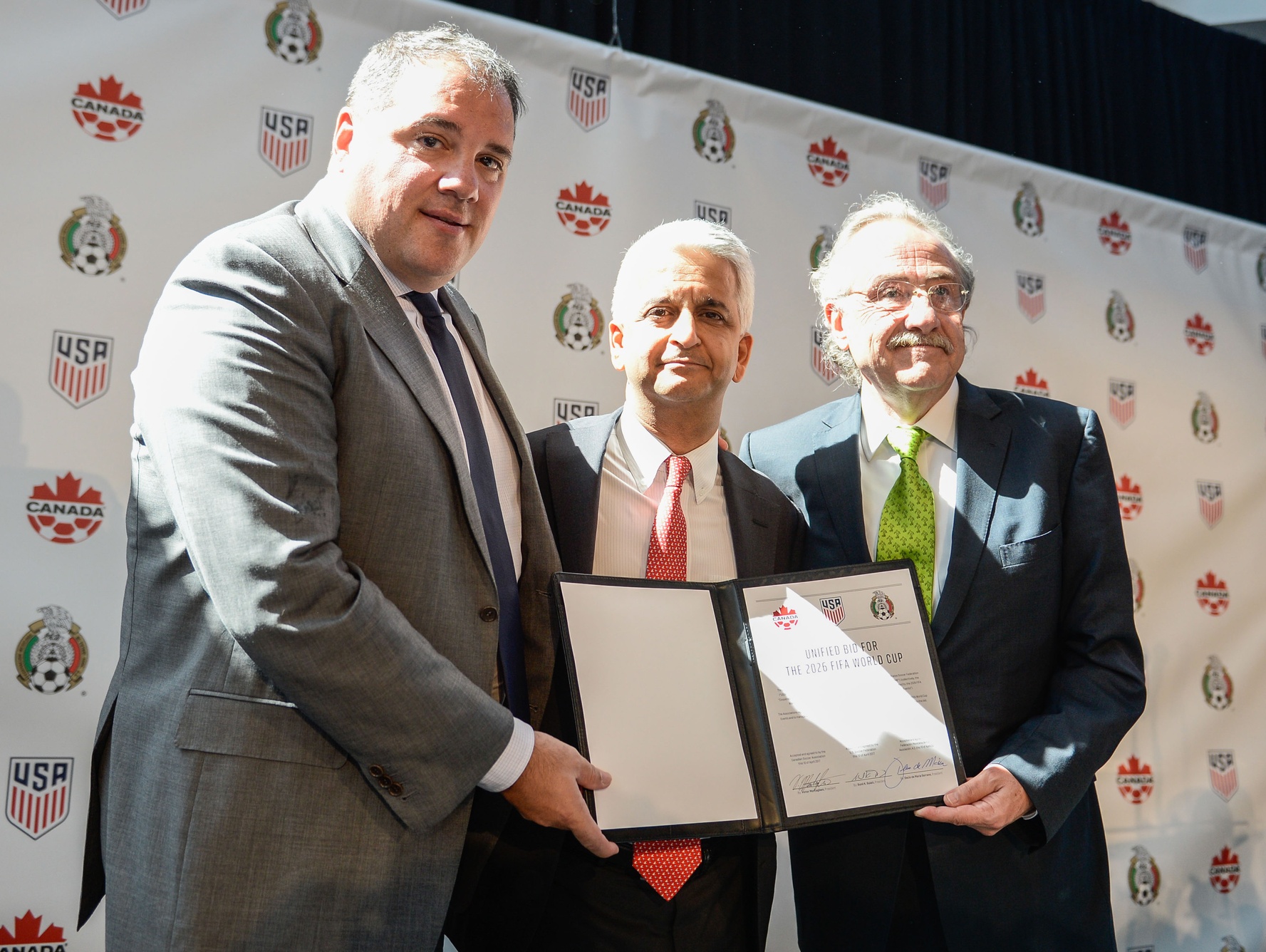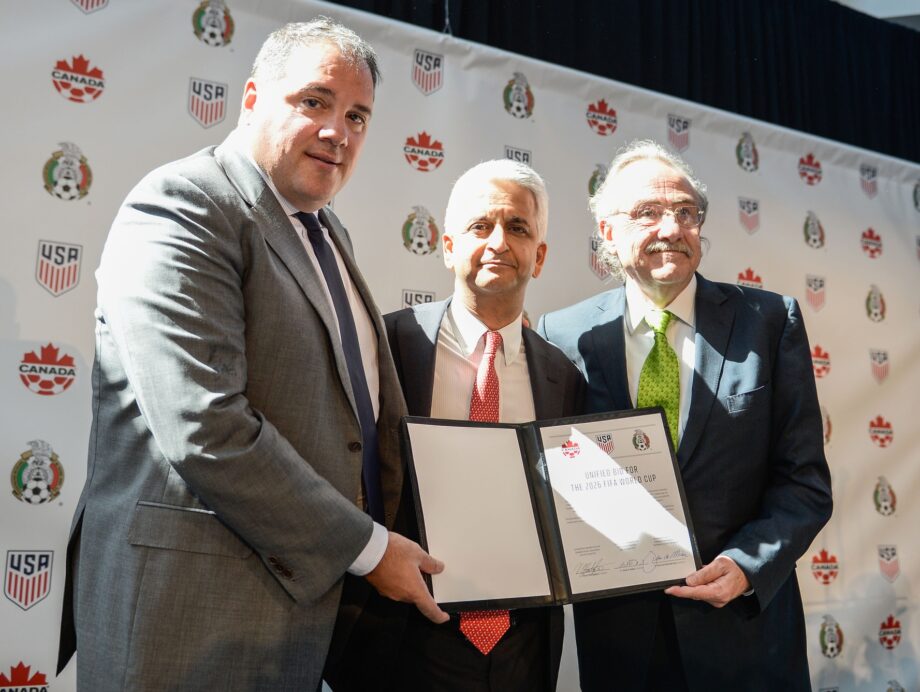
On FIFA’s deadline for competing bids, North America has moved one step closer to hosting the 2026 World Cup, even if there is a new competitor in the fold.
As expected, the U.S. Soccer Federation announced their official bid to formally going the competition of hosting the 2026 World Cup on American, Mexican and Canadian soil. The official statement, comes as no surprise as the trio are presumable front-runners to host the game’s most prestigious tournament come 2026, despite Morocco joining the race earlier today.
“We’ve always been prepared for the fact that there’ll be other people who are interested in this. It shows how valuable and important the World Cup is,” U.S. Soccer president Sunil Gulati said. “Regardless of whether other countries were bidding, we would treat this as a competition. Whether it was in the nature of a time trial where other people aren’t on the track or when there’s other runners on the track, in this case other competitors. So we’re going to treat every part of the bid application very, very seriously and exceed all of FIFA’s standards and make it impossible for them to say “why not the U.S., Mexico and Canada?”
“We’re confident that we have the facilities and the infrastructure – everything,” he added. “Now what it’s about is convincing the rest of the world that our vision for the sport, our vision internationally for the sport, is in line with what they believe and also that a World Cup in the United States, Canada, and Mexico will be extraordinarily successful. A big part of FIFA’s revenues come from this one event and we think we can put on a spectacular event and one that’s very, very financially successful as well.”
U.S. Soccer is set to provide an update on the cities in the running to host within the next week.
The two bids must now submit their proposal for consideration by FIFA by March 16, 2018. Then, a decision on whether to select one of the bidders will be taken at the FIFA Congress, which is set to be convened next June.
“This is going to be a great process over the next 10 months and then beyond,” Gulati said. “We’ve talked to a number of cities across the country and in Canada and Mexico and they’re excited about the World Cup. So there’ll be a little bit of friendly competition here to be one of the final selected venues. We’ve talked to many of those cities already. They’re excited, they’re enthusiastic, they want to be part of the World Cup.
“As some of them have said to us, ‘We weren’t really ready seven years ago because we didn’t see the big picture about what this was all about.’ Now they’ve seen what happened in South Africa, they’ve seen what happened in Brazil, and they’re excited about it. And that’s true in the U.S., it’s true in Canada, and Mexico, our two partners in this thing.”


This is purely-and-only a negotiating gambit from FIFA. Repulsive in some ways, but in other ways totally understandable, because frankly it’s simple negotiation economics…. A bid scenario (even a perceived one) is a far better position to be in than dealing with a sole buyer. It’s a dead ringer for the Zimbabwe “bid” that happened when it appeared Canada would be the sole bidder for the Women’s World Cup in 2015.
To elaborate, FIFA still has to set terms with whoever the selected bidder is. This will take years.
And the World Cup is where FIFA makes money in big, big chunks. There are literally hundreds of points to be negotiated — everything from licensing fees to infrastructure upgrades to the providers of the stadium concessions — where FIFA and the USA-MEX-CAN joint bid will make horse trades that are worth millions of dollars. FIFA quite rightly (if greedily) doesn’t want to be in a position of dealing with a sole bidder.
Whether or not they can sell the believability of the Morocco bid (which appeared quite hastily and and probably at minimal/zero cost to Morocco itself) remains to be determined, but I suspect FIFA would rather have a flimsy backup bid in hand than none at all.
Maybe the bluff should be called. Let Morocco host. FIFA can choke on their greed and try to get blood out of that turnip. Maybe Canada should have withdrawn their bid at the close and let FIFA select Zimbabwe.
The Morocco bid just feels like a ploy. FIFA can extract better terms from the joint US bid if they are in a competitive bid situation. Very similar to the “bid” Zimbabwe made when it looked like Canada would run unopposed to host the WWC in 2015. Different FIFA, same money-hungry tactics.
LOL! Somehow (wink wink) a tiny country such as Qatar gest the WC, and now we are supposed to seriously consider Morocco. But for the US- we must combine a bid with Mexico and Canada?
I see that as more of doing a favor for Canada. They would never be able to host the WC by themselves, so this is a chance for them to be involved. I think we’re going to see that more often from now on, allowing smaller countries to team up with larger ones – especially with the expanded field.
Morocco is a lovely country which everyone should visit but it simply doesn’t have the infrastructure to host an expanded World Cup with 80 games.